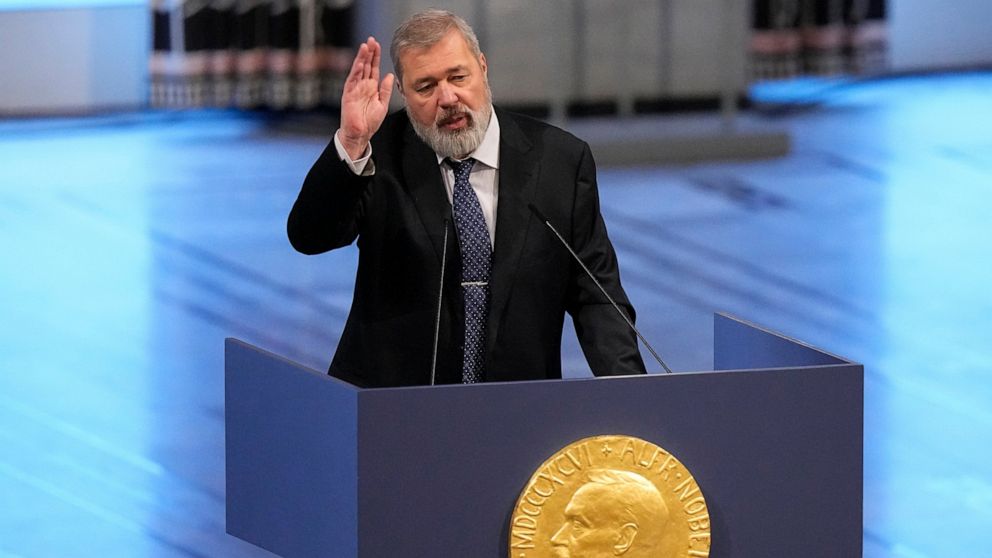Nobel Peace Prize-winner’s paper closes amid Russia pressure
Russia’s leading independent newspaper has suspended operations under pressure from the authorities
Russia’s leading independent newspaper suspended operations Monday after pressure from Russian authorities, a move that comes less than six months after its editor won the Nobel Peace Prize for his paper’s courageous reporting under difficult circumstances.
The paper, Novaya Gazeta, said it will remain closed for the duration of what the newspaper referred to in quotations as “the special operation” in Ukraine, the term that Russian authorities insist media must use.
The newspaper was the last major independent media outlet critical of President Vladimir Putin’s government after others either shut their doors or had their websites blocked since Russia’s invasion of Ukraine began on Feb. 24.
The trigger for the shutdown was a second formal warning from the Russian media regulator Roskomnadzor, which has increasingly taken on the role of a censor in recent years, Novaya Gazeta had long had a difficult relationship with the government.
Novaya Gazeta’s longtime editor Dmitry Muratov shared the 2021 Nobel Peace Prize with Maria Ressa, a journalist from the Philippines, in October. Muratov said last week he was donating his Nobel medal to be auctioned off to raise funds for Ukrainian refugees and called for an immediate cease-fire in Ukraine.
Exactly why Novaya Gazeta was warned remains unclear. Roskomnadzor told state news agency Tass that the newspaper had failed to identify an unnamed non-governmental organization as a “foreign agent” in its reporting, as required by Russian law. It didn’t specify the report in question.
Novaya Gazeta has trodden a fine line during the war in Ukraine. It initially defied the Russian authorities’ restrictions, publishing in Russian and Ukrainian the day after the invasion began. However, it removed much of its war reporting from its website after Russian lawmakers passed a law March 4 threatening jail terms of up to 15 years for information deemed to be “fake” by Russian authorities. That can include any mention of Russian forces harming civilians or suffering losses on the battlefield.
On Sunday, Muratov sent in questions for an interview with Ukrainian President Volodymyr Zelenskyy along with a group of Russian journalists. Roskomnadzor banned the publication of the interview with Zelenskyy in Russia and said the media outlets which took part would be investigated.
“A country without media (the last free “Novaya Gazeta” was closed), without discussion, without political competition, without a full-fledged parliament,” Zelenskyy adviser Mykhailo Podolyak wrote on Twitter on Monday. ”This is the modern (Russian Federation). That is why Russians do not see, hear or realize anything. No matter what language you speak to them.”
In its citation, the Norwegian Nobel Committee noted that six of Novaya Gazeta’s journalists had been killed. The best known of them was Anna Politkovskaya, who reported on atrocities during the second Chechen War at the start of Putin’s first term as Russian president. She was shot dead in her apartment building in 2006. Five men were convicted of involvement in her murder in 2014, but there has never been a ruling on who ordered her killing.
Muratov said that winning the Nobel Prize was “recognition of the memory of our fallen colleagues,” including Politkovskaya.
Novaya Gazeta was itself born from the legacy of another Russian Nobel Peace Prize-winner, the former Soviet leader Mikhail Gorbachev. He won the Peace Prize in 1990 and used part of the award to fund what later became Novaya Gazeta, which launched in 1993.
Putin had a warning for Muratov after his win last year, when asked if the paper could follow other media in being given the dreaded “foreign agent” label by Russian authorities, which must be added to every article a media outlet produces and carries a pejorative connotation.
“If (Muratov) doesn’t break Russian law and if he doesn’t give a reason to be announced as a foreign agent, then he won’t be,” Putin said. “But if he hides behind the Nobel Prize like a shield to do something which breaks Russian law, that means he’s doing it consciously to attract attention to himself.”
———
Follow all AP stories on Russia’s war on Ukraine at https://apnews.com/hub/russia-ukraine.
![]()


